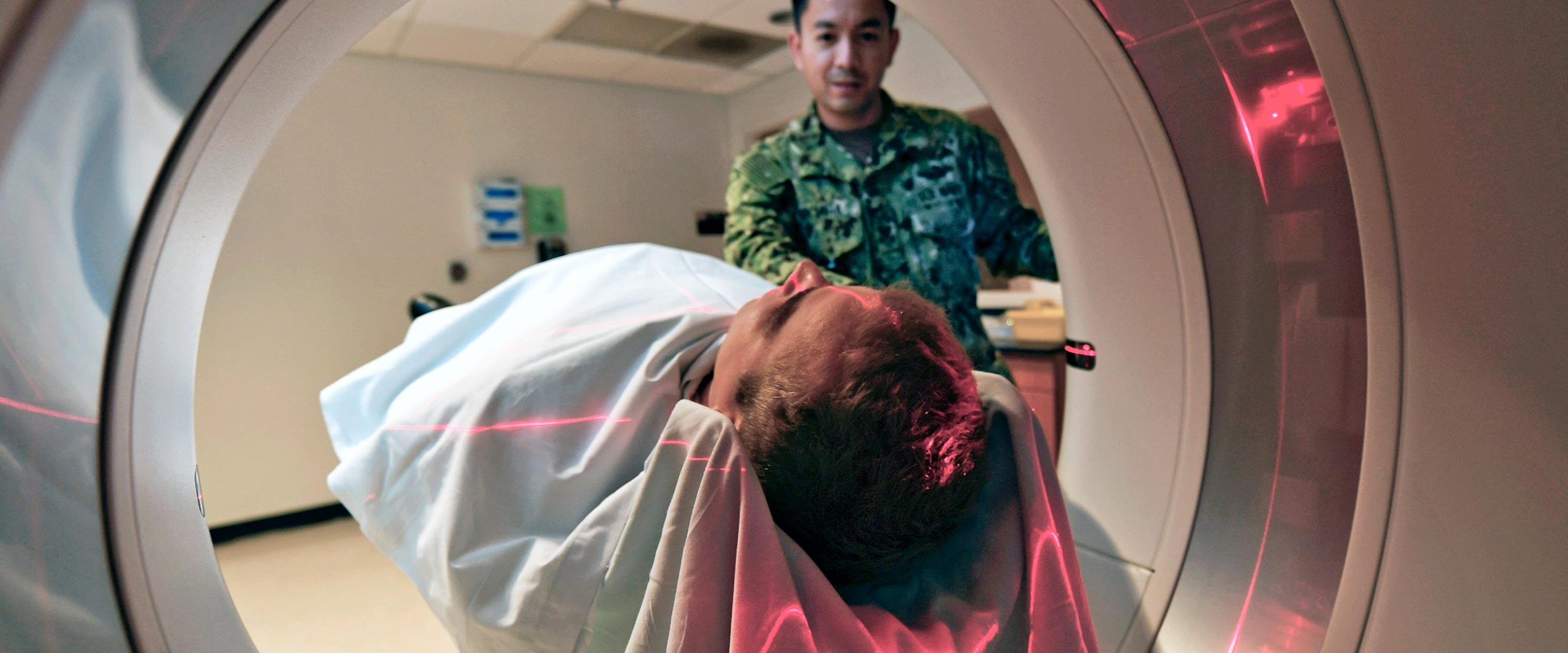More Information
Responsibilities
Navy Radiation Health Specialists are health and safety experts responsible for all aspects of an occupational radiation protection program. They apply clinical medical physics expertise in diagnostic radiology and ensure compliance with Navy, Department of Defense and federal regulations. Specifically, Radiation Health Specialists may be called upon to:
- Plan, direct and administer radiation protection programs
- Recommend appropriate radiation control measures
- Act as liaison between Navy and other services and federal agencies
- Assist physicians in disease diagnosis and treatment
- Provide formal instruction and on-the-job training in radiation health programs
- Serve as an instructor in training programs for technicians and other health care workers
Work Environment
Radiation Health Specialists may serve at any one of more than 250 Navy and medical facilities around the globe, from Hawaii to Japan, Germany to Guam, and Washington, D.C., to Washington state. As a Radiation Health Specialist, you could work at one of the highly acclaimed National Naval Medical Centers in Bethesda, MD; Portsmouth, VA; and San Diego, CA. Or you could provide support aboard one of two dedicated hospital ships: the USNS Comfort and USNS Mercy. More opportunities are available stateside and abroad in a variety of settings. Serve on a nuclear-powered aircraft carrier or at nuclear-capable shipyards and repair facilities, medical treatment facilities, and industrial and research facilities such as the Naval Surface Warfare Center (NSWC).
Training & Advancement
Upon graduation from college, those pursuing a Radiation Health Specialist position are required to attend Officer Development School (ODS) in Newport, RI. ODS is a 5-week program that provides a comprehensive and intense introduction to the responsibilities of Navy Staff Corps Officers. Here they learn about the military structure of the U.S. Navy, its rich history of traditions and customs, leadership development and military etiquette.
Additional training may be available at the Naval Aerospace Medicine Institute (NAMI) in Pensacola, Florida. Once training is complete, you may be assigned to a dedicated hospital ship, shore-based medical facility, nuclear-powered aircraft carrier, nuclear-capable shipyard, or a research facility.
Promotion opportunities are regularly available but competitive and based on performance.
It’s also important to note that specialized training received and work experience gained in the course of service can lead to valuable credentialing and occupational opportunities in related fields.
Education Opportunities
Wherever you are in your professional career, the Navy can help ease your financial burdens and advance your career with generous financial assistance and continuing education programs. Opportunities for further education within this platform include:
- Navy College Program
- VOLED Assistance Center
- VOLED Region Advisors
- The Naval Postgraduate School (NPS)
- Naval War College (NWC)
- USAF Air University Air Command and Staff College
Through the Navy Health Professions Loan Repayment Program (HPLRP), you may be eligible to receive financial assistance to pay down the cost of your graduate education.
Qualifications & Requirements
A degree from a four-year college or university is a minimum educational requirement to become a Commissioned Officer. You must also attend Officer Development School (ODS).
Preferred candidates are those who have:
- Completed a Master of Science degree in health physics or medical physics.
- Accreditation by the Commission on Accreditation of Medical Physics Education Programs, Inc.
- A minimum GPA of 3.0 on a 4.0 scale
- Field experience in health or medical physics
- Certification from the American Board of Health Physicists or American Board of Radiology
General qualifications may vary depending upon whether you’re currently serving, whether you’ve served before or whether you’ve never served before.
Part-Time Opportunities
Serving part-time as a Navy Reserve Officer, your duties will be carried out during your scheduled drilling and training periods. During monthly drilling, Radiation Health Specialists in the Navy Reserve typically work at a location close to their homes. This gives you the flexibility to expand your profession in the Navy without compromising your civilian practice at home.
For annual training, Radiation Health Specialists may serve anywhere in the world, whether at sea, in hospitals stateside, or on bases in countries around the world.
Take a moment to learn more about the general roles and responsibilities of Navy Reserve Sailors.
Most of what you do in the Navy Reserve is considered training. The basic Navy Reserve commitment involves training a minimum of one weekend a month (referred to as drilling) and two weeks a year (referred to as Annual Training) – or the equivalent of that.
For current or former Navy Officers (NAVET): Prior experience satisfies the initial leadership training requirement – so you will not need to go through Officer Training again.
For current or former Officers of military branches other than the Navy (OSVET), as well as for Officer candidates without prior military experience: Officer candidates are required to attend Officer Development School (ODS) in Newport, RI. ODS is a five-week program that provides a comprehensive and intense introduction to the responsibilities of Navy Staff Corps Officers. Officers who previously held a commission in another United States Military Service, National Oceanic and Atmospheric Administration, Public Health Service, or United States Coast Guard are exempt from attending ODS or LDO/CWO Academy.































































































































